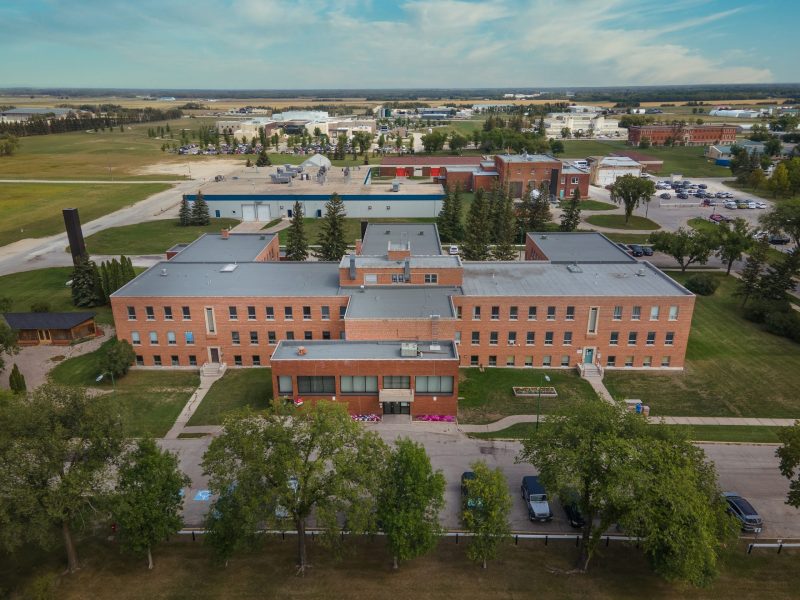Training and Employment Support
The following is a comprehensive list of Training, Employment and Human Resource programs available by various levels of government, not-for-profits, and various other agencies. Subsidies, grants, tax credits and counselling may be available to fit a company’s training and employment needs.


Red River College’s Interlake and Peguis – Fisher River Campuses
The Campus serves the communities in the Interlake and North Eastman region by providing a variety of community-based programs and part-time courses.
The administrative offices located in Selkirk manage and coordinate training in locations throughout the Interlake and North Eastman region, with campuses located in Selkirk, Peguis, and Fisher River.
Programs and courses reflect industry needs and instructors bring expertise and industry knowledge into the classroom. These programs prepare students to become leaders in their chosen field of study, and partners with industry to ensure curriculum is up to date and relevant in today’s work environment with hands-on learning experiences, speakers, and on-the-job learning opportunities.
Academy of Learning Career College
The College provides diploma programs for students interested in careers in business, accounting, community service, education, health care, home inspection, computer service – blockchain technology and web design.


Herzing College
Students of Herzing College prepare for employment as health care aides through the comprehensive five-month program offered at this private career college in Selkirk.
Manitoba Jobs and Skills Development Centre
Training and Employment Services at the Centre supports labour market development activities that link individual needs with opportunities in the workforce and delivers employment services through partnerships with community, industry, and employer groups.

Workplace Education Manitoba
As essential skills experts, Workplace Education Manitoba develops the best-fitting workplace Essential Skills solutions. They partner with companies to ensure a clear understanding of their needs and goals. Then, if training is appropriate, they move forward together to develop and deliver the most appropriate response. Their workplace Essential Skills solutions are custom designed to fit the specific needs and goals of their client’s workplace.


Employee Share Purchase Tax Credit
The Employee Share Purchase Tax Credit offers employees (including directors and officers of an eligible corporation) the opportunity to buy into and own a portion of a business under an Employee Share Ownership Plan (ESOP). The aim of the program is to support business growth, facilitate succession planning for family businesses and promote employee participation in business success. Those who buy shares from a registered ESOP will qualify for a partially refundable 45 percent tax credit.
Paid Work Experience Tax Credits (PWETC) - (formerly Co-op Education and Apprenticeship Tax Credits)
The Paid Work Experience family of tax credits provides qualified employers with a percentage of the wages and salaries paid to certain types of trainee employees and recent graduates working in Manitoba. These wages and salaries are calculated net of other government funding for that remuneration. Eligible employers include taxable corporations and exempt corporate entities (such as not-for-profit agencies, Manitoba Crown entities, municipalities, universities, schools, and hospitals), which must claim the fully refundable credit in the company financial year in which it is earned. In addition, unincorporated employers can claim the refundable credit on their individual income tax return in the tax year in which it is earned. All components of this tax credit are fully refundable for all types of eligible employers.
The Co-op Student Hiring Incentive and high school apprentice component has been significantly enhanced and expanded to help promote more paid work and on-the-job training opportunities for students. Eligibility now includes employers who hire a student in a wide range of registered high school vocational programs that are not connected with the apprenticeship system. These include programs in areas such as health care, childcare, business and hospitality. The new stream of support for high-school co-op students provides a refundable tax credit worth 25% of eligible wages and salaries, up to a lifetime maximum of $5,000 per student.


Apprenticeship Job Creation Tax Credit
A non-refundable Investment Tax Credit (ITC) equal to 10% of the eligible salaries and wages payable to eligible apprentices in respect of employment after May 1, 2006. The maximum credit an employer can claim is $2,000 per year for each eligible apprentice. If your business hires an eligible apprentice, you qualify to claim the credit.
Manitoba Film and Video Production Tax Credit
A refundable tax credit for film and video productions is available, based on eligible salaries paid to Manitoba residents and qualifying non-resident employees for work performed on an eligible film or video produced in Manitoba. The basic rate of the credit has been 45% (see Manitoba Film and Sound).
Salary associated with non-resident employees cannot exceed 30% of eligible salaries paid to Manitoba residents when two or more Manitoba residents are trained for each non-resident employee; or 10% if only one Manitoba resident is trained.
A 5% rural and northern bonus applies on eligible salaries paid for work performed in Manitoba on productions where a permanent establishment of the applicant corporation is located, and 50% of principal photography days took place, at least 35 kilometers from Winnipeg.
With the frequent-filming bonus, producer bonus and rural and northern bonus, a film that meets all program criteria may now earn a maximum 65% credit on eligible salaries.
Production companies can elect to claim either the film tax credit based on eligible labour costs (described above), or a 30% tax credit based on production costs incurred and paid, for labour, goods, and services provided in Manitoba that are directly attributable to the production of an eligible film. Such production costs can also include accommodation costs incurred and paid up to $250 per night per unit, as eligible tangible property expenditures.


Industry Expansion Program
The Industry Expansion Program is aimed at supporting companies that are locating new operations in Manitoba or expanding existing operations.
The program assists companies by contributing to their investment in skills training for employees. Financial assistance may be available to businesses to pay for eligible expenditures related to the development and delivery of appropriate training for employees.
Support under this program is custom-prepared on a client-by-client basis. The amount of funding assistance provided is based on the creation and maintenance of quality jobs and the economic benefit to Manitoba resulting from these new employment opportunities.
Funding is not available for ongoing routine business costs (ex: operational, administrative, maintenance, recruitment, capital costs, salaries), research or scoping activities, and activities that have already occurred.
Canada-Manitoba Job Grant
The Canada-Manitoba Job Grant is an employer-driven approach to help Manitobans gain the skills they need to fill available jobs and to help employers develop the skills of their existing workers to meet the requirements of their present job, or to move into a better job.
Eligible employers may apply for up to $10,000 for each individual worker to assist with training costs. Employers that receive funding under the Canada-Manitoba Job Grant must contribute a minimum of one-third of the eligible training costs. With the maximum government contribution of $10,000, this means that up to $15,000 is available, per person, for eligible training costs.


Workforce Development Program
The Workforce Development Program assists companies that require a comprehensive approach to human resource management through needs assessment, analysis, and training support. The program provides human resource planning assistance and funding support for training development and delivery.
Workforce development consultants offer value-added service by linking companies with a range of services, programs and supports available from government and other organizations.
After an initial assessment, the Workforce Development Team works with each company to develop a customized human resource and staff development strategy. A workforce development consultant then brings together various partners who deliver supports and services that can assist companies in meeting their needs. These partners may include other government departments/agencies, third-party service providers and external consultants.
For more information about Selkirk’s Incentives and Support, please go to Government Programs in our Data and Maps: Site Selection Tables.



